Organ Trade and Human Dignity
VerifiedAdded on 2023/01/18
|6
|1942
|23
AI Summary
This essay discusses the issue of organ trade and transplantation in relation to human dignity and other principles. It analyzes the causes and factors contributing to this problem and explores the perspectives on the impact on human dignity. The essay also highlights the violation of human rights and the need for regulation in organ trade.
Contribute Materials
Your contribution can guide someone’s learning journey. Share your
documents today.
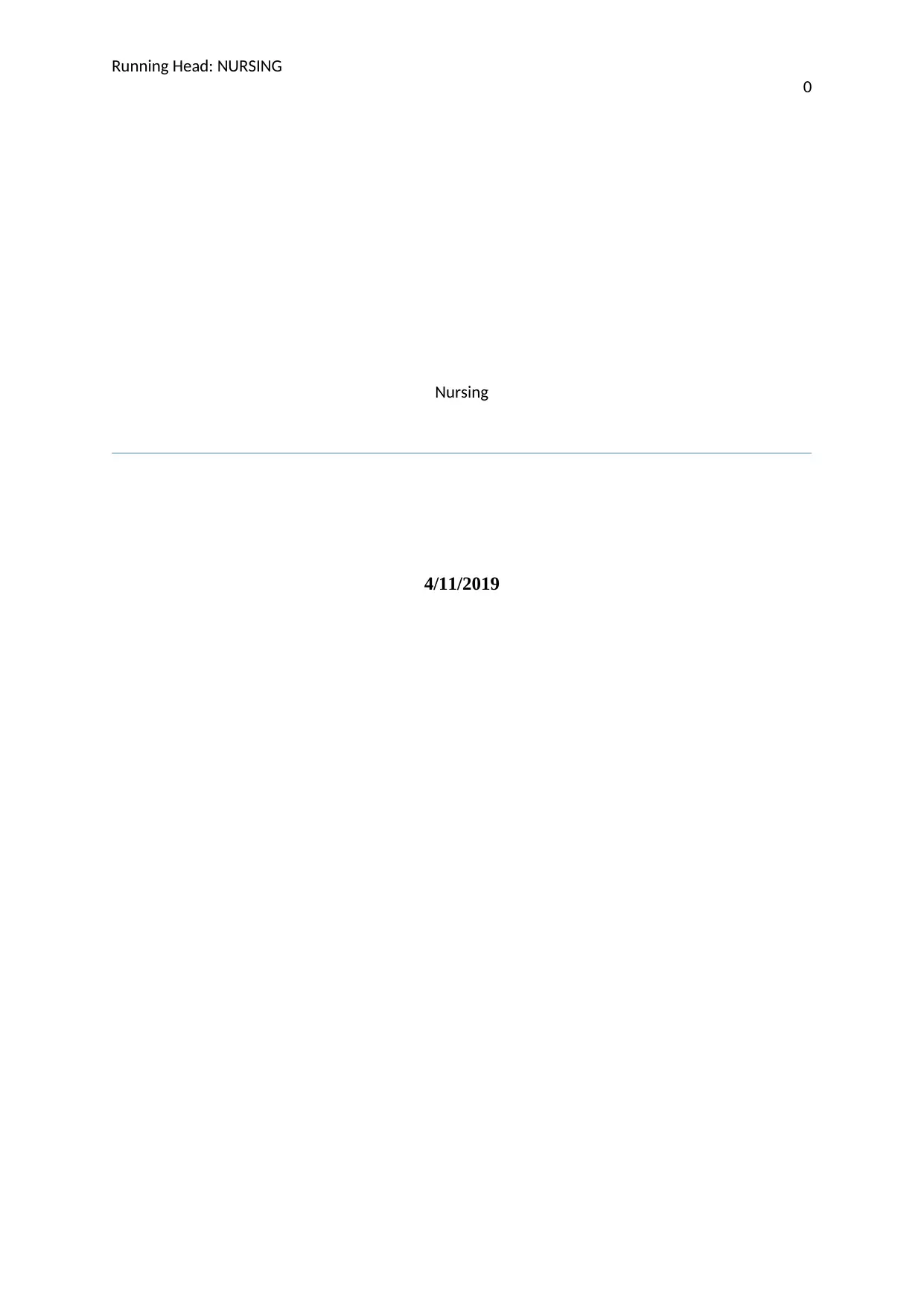
Running Head: NURSING
0
Nursing
4/11/2019
0
Nursing
4/11/2019
Secure Best Marks with AI Grader
Need help grading? Try our AI Grader for instant feedback on your assignments.
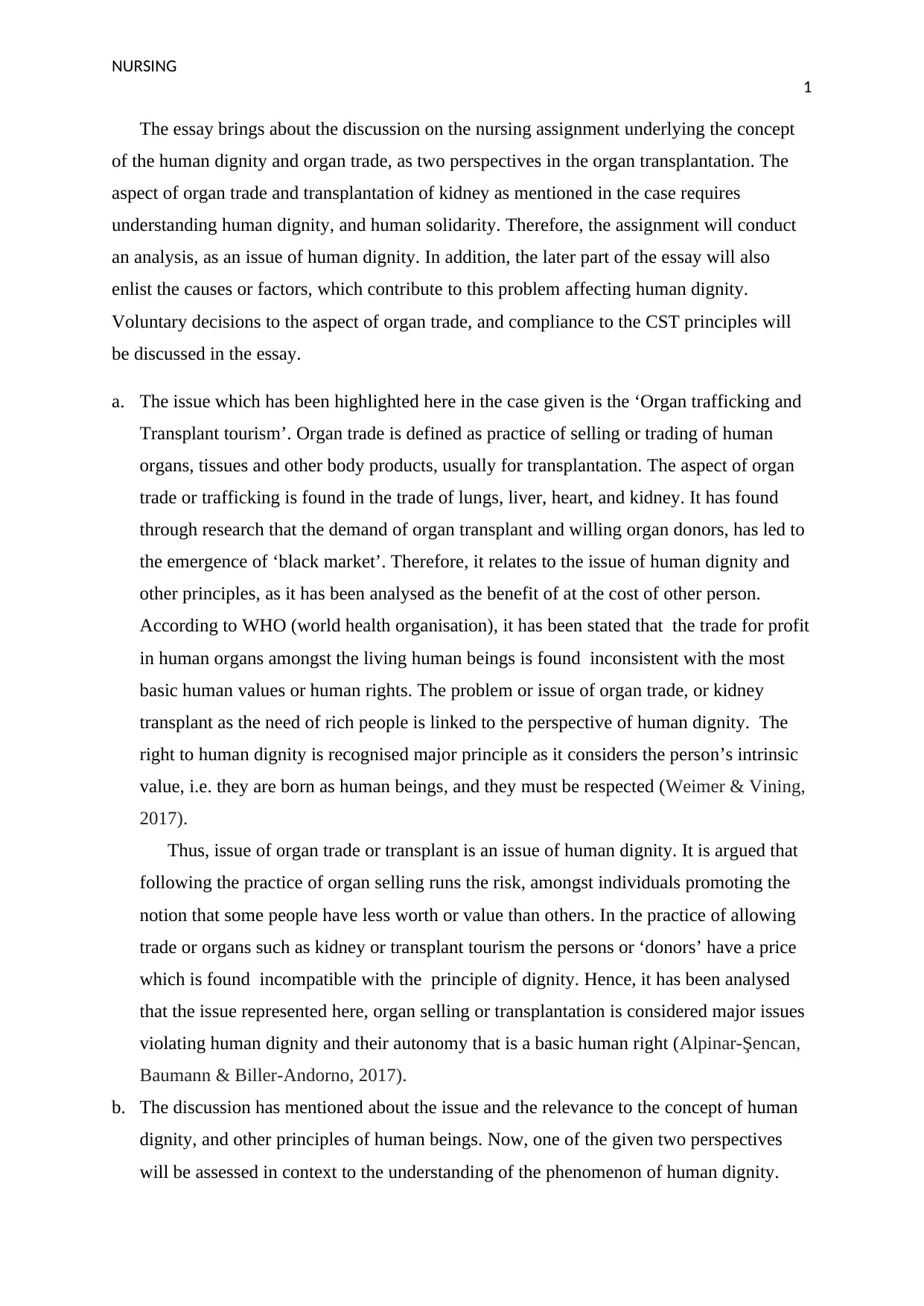
NURSING
1
The essay brings about the discussion on the nursing assignment underlying the concept
of the human dignity and organ trade, as two perspectives in the organ transplantation. The
aspect of organ trade and transplantation of kidney as mentioned in the case requires
understanding human dignity, and human solidarity. Therefore, the assignment will conduct
an analysis, as an issue of human dignity. In addition, the later part of the essay will also
enlist the causes or factors, which contribute to this problem affecting human dignity.
Voluntary decisions to the aspect of organ trade, and compliance to the CST principles will
be discussed in the essay.
a. The issue which has been highlighted here in the case given is the ‘Organ trafficking and
Transplant tourism’. Organ trade is defined as practice of selling or trading of human
organs, tissues and other body products, usually for transplantation. The aspect of organ
trade or trafficking is found in the trade of lungs, liver, heart, and kidney. It has found
through research that the demand of organ transplant and willing organ donors, has led to
the emergence of ‘black market’. Therefore, it relates to the issue of human dignity and
other principles, as it has been analysed as the benefit of at the cost of other person.
According to WHO (world health organisation), it has been stated that the trade for profit
in human organs amongst the living human beings is found inconsistent with the most
basic human values or human rights. The problem or issue of organ trade, or kidney
transplant as the need of rich people is linked to the perspective of human dignity. The
right to human dignity is recognised major principle as it considers the person’s intrinsic
value, i.e. they are born as human beings, and they must be respected (Weimer & Vining,
2017).
Thus, issue of organ trade or transplant is an issue of human dignity. It is argued that
following the practice of organ selling runs the risk, amongst individuals promoting the
notion that some people have less worth or value than others. In the practice of allowing
trade or organs such as kidney or transplant tourism the persons or ‘donors’ have a price
which is found incompatible with the principle of dignity. Hence, it has been analysed
that the issue represented here, organ selling or transplantation is considered major issues
violating human dignity and their autonomy that is a basic human right (Alpinar-Şencan,
Baumann & Biller-Andorno, 2017).
b. The discussion has mentioned about the issue and the relevance to the concept of human
dignity, and other principles of human beings. Now, one of the given two perspectives
will be assessed in context to the understanding of the phenomenon of human dignity.
1
The essay brings about the discussion on the nursing assignment underlying the concept
of the human dignity and organ trade, as two perspectives in the organ transplantation. The
aspect of organ trade and transplantation of kidney as mentioned in the case requires
understanding human dignity, and human solidarity. Therefore, the assignment will conduct
an analysis, as an issue of human dignity. In addition, the later part of the essay will also
enlist the causes or factors, which contribute to this problem affecting human dignity.
Voluntary decisions to the aspect of organ trade, and compliance to the CST principles will
be discussed in the essay.
a. The issue which has been highlighted here in the case given is the ‘Organ trafficking and
Transplant tourism’. Organ trade is defined as practice of selling or trading of human
organs, tissues and other body products, usually for transplantation. The aspect of organ
trade or trafficking is found in the trade of lungs, liver, heart, and kidney. It has found
through research that the demand of organ transplant and willing organ donors, has led to
the emergence of ‘black market’. Therefore, it relates to the issue of human dignity and
other principles, as it has been analysed as the benefit of at the cost of other person.
According to WHO (world health organisation), it has been stated that the trade for profit
in human organs amongst the living human beings is found inconsistent with the most
basic human values or human rights. The problem or issue of organ trade, or kidney
transplant as the need of rich people is linked to the perspective of human dignity. The
right to human dignity is recognised major principle as it considers the person’s intrinsic
value, i.e. they are born as human beings, and they must be respected (Weimer & Vining,
2017).
Thus, issue of organ trade or transplant is an issue of human dignity. It is argued that
following the practice of organ selling runs the risk, amongst individuals promoting the
notion that some people have less worth or value than others. In the practice of allowing
trade or organs such as kidney or transplant tourism the persons or ‘donors’ have a price
which is found incompatible with the principle of dignity. Hence, it has been analysed
that the issue represented here, organ selling or transplantation is considered major issues
violating human dignity and their autonomy that is a basic human right (Alpinar-Şencan,
Baumann & Biller-Andorno, 2017).
b. The discussion has mentioned about the issue and the relevance to the concept of human
dignity, and other principles of human beings. Now, one of the given two perspectives
will be assessed in context to the understanding of the phenomenon of human dignity.
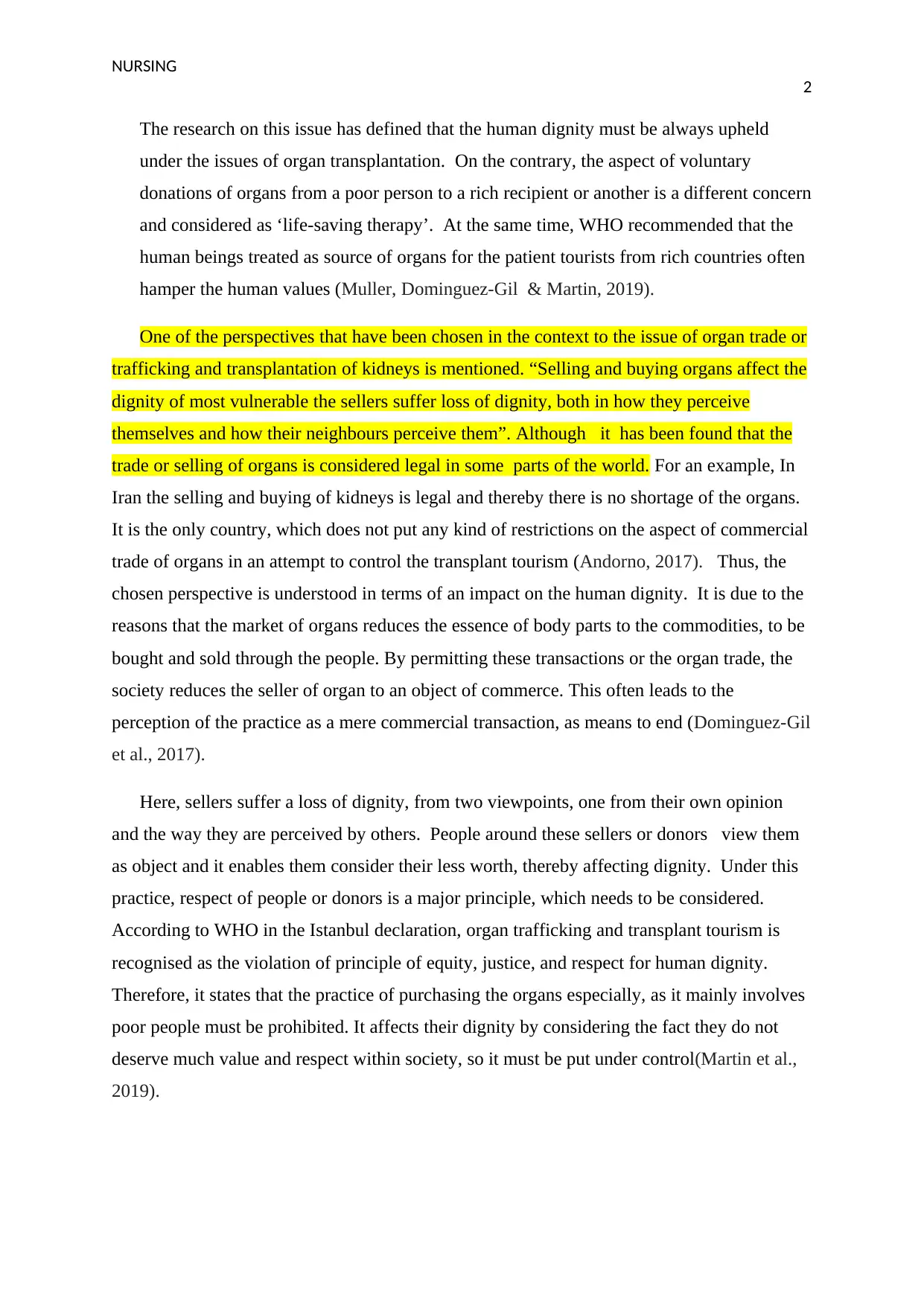
NURSING
2
The research on this issue has defined that the human dignity must be always upheld
under the issues of organ transplantation. On the contrary, the aspect of voluntary
donations of organs from a poor person to a rich recipient or another is a different concern
and considered as ‘life-saving therapy’. At the same time, WHO recommended that the
human beings treated as source of organs for the patient tourists from rich countries often
hamper the human values (Muller, Dominguez-Gil & Martin, 2019).
One of the perspectives that have been chosen in the context to the issue of organ trade or
trafficking and transplantation of kidneys is mentioned. “Selling and buying organs affect the
dignity of most vulnerable the sellers suffer loss of dignity, both in how they perceive
themselves and how their neighbours perceive them”. Although it has been found that the
trade or selling of organs is considered legal in some parts of the world. For an example, In
Iran the selling and buying of kidneys is legal and thereby there is no shortage of the organs.
It is the only country, which does not put any kind of restrictions on the aspect of commercial
trade of organs in an attempt to control the transplant tourism (Andorno, 2017). Thus, the
chosen perspective is understood in terms of an impact on the human dignity. It is due to the
reasons that the market of organs reduces the essence of body parts to the commodities, to be
bought and sold through the people. By permitting these transactions or the organ trade, the
society reduces the seller of organ to an object of commerce. This often leads to the
perception of the practice as a mere commercial transaction, as means to end (Dominguez-Gil
et al., 2017).
Here, sellers suffer a loss of dignity, from two viewpoints, one from their own opinion
and the way they are perceived by others. People around these sellers or donors view them
as object and it enables them consider their less worth, thereby affecting dignity. Under this
practice, respect of people or donors is a major principle, which needs to be considered.
According to WHO in the Istanbul declaration, organ trafficking and transplant tourism is
recognised as the violation of principle of equity, justice, and respect for human dignity.
Therefore, it states that the practice of purchasing the organs especially, as it mainly involves
poor people must be prohibited. It affects their dignity by considering the fact they do not
deserve much value and respect within society, so it must be put under control(Martin et al.,
2019).
2
The research on this issue has defined that the human dignity must be always upheld
under the issues of organ transplantation. On the contrary, the aspect of voluntary
donations of organs from a poor person to a rich recipient or another is a different concern
and considered as ‘life-saving therapy’. At the same time, WHO recommended that the
human beings treated as source of organs for the patient tourists from rich countries often
hamper the human values (Muller, Dominguez-Gil & Martin, 2019).
One of the perspectives that have been chosen in the context to the issue of organ trade or
trafficking and transplantation of kidneys is mentioned. “Selling and buying organs affect the
dignity of most vulnerable the sellers suffer loss of dignity, both in how they perceive
themselves and how their neighbours perceive them”. Although it has been found that the
trade or selling of organs is considered legal in some parts of the world. For an example, In
Iran the selling and buying of kidneys is legal and thereby there is no shortage of the organs.
It is the only country, which does not put any kind of restrictions on the aspect of commercial
trade of organs in an attempt to control the transplant tourism (Andorno, 2017). Thus, the
chosen perspective is understood in terms of an impact on the human dignity. It is due to the
reasons that the market of organs reduces the essence of body parts to the commodities, to be
bought and sold through the people. By permitting these transactions or the organ trade, the
society reduces the seller of organ to an object of commerce. This often leads to the
perception of the practice as a mere commercial transaction, as means to end (Dominguez-Gil
et al., 2017).
Here, sellers suffer a loss of dignity, from two viewpoints, one from their own opinion
and the way they are perceived by others. People around these sellers or donors view them
as object and it enables them consider their less worth, thereby affecting dignity. Under this
practice, respect of people or donors is a major principle, which needs to be considered.
According to WHO in the Istanbul declaration, organ trafficking and transplant tourism is
recognised as the violation of principle of equity, justice, and respect for human dignity.
Therefore, it states that the practice of purchasing the organs especially, as it mainly involves
poor people must be prohibited. It affects their dignity by considering the fact they do not
deserve much value and respect within society, so it must be put under control(Martin et al.,
2019).
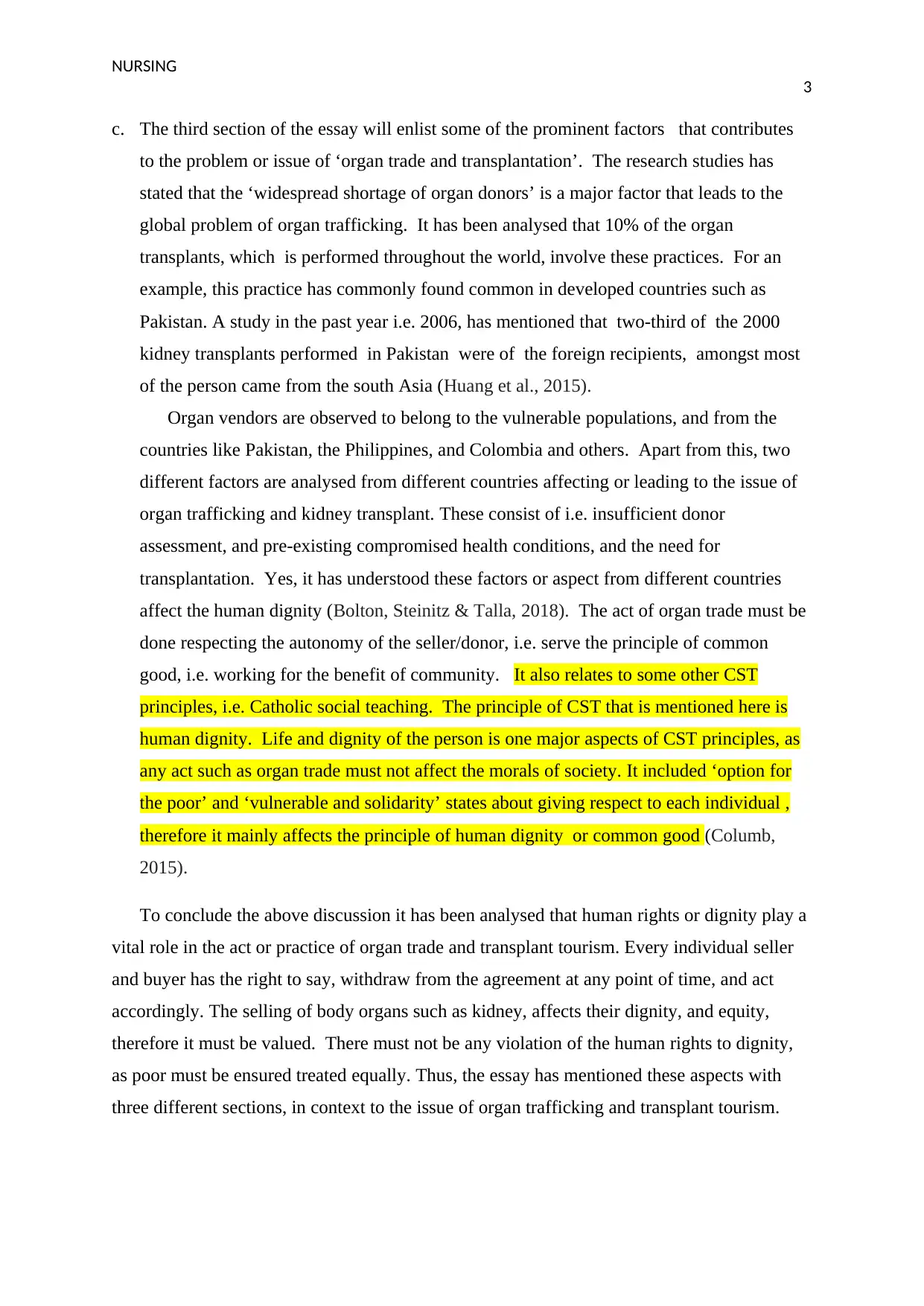
NURSING
3
c. The third section of the essay will enlist some of the prominent factors that contributes
to the problem or issue of ‘organ trade and transplantation’. The research studies has
stated that the ‘widespread shortage of organ donors’ is a major factor that leads to the
global problem of organ trafficking. It has been analysed that 10% of the organ
transplants, which is performed throughout the world, involve these practices. For an
example, this practice has commonly found common in developed countries such as
Pakistan. A study in the past year i.e. 2006, has mentioned that two-third of the 2000
kidney transplants performed in Pakistan were of the foreign recipients, amongst most
of the person came from the south Asia (Huang et al., 2015).
Organ vendors are observed to belong to the vulnerable populations, and from the
countries like Pakistan, the Philippines, and Colombia and others. Apart from this, two
different factors are analysed from different countries affecting or leading to the issue of
organ trafficking and kidney transplant. These consist of i.e. insufficient donor
assessment, and pre-existing compromised health conditions, and the need for
transplantation. Yes, it has understood these factors or aspect from different countries
affect the human dignity (Bolton, Steinitz & Talla, 2018). The act of organ trade must be
done respecting the autonomy of the seller/donor, i.e. serve the principle of common
good, i.e. working for the benefit of community. It also relates to some other CST
principles, i.e. Catholic social teaching. The principle of CST that is mentioned here is
human dignity. Life and dignity of the person is one major aspects of CST principles, as
any act such as organ trade must not affect the morals of society. It included ‘option for
the poor’ and ‘vulnerable and solidarity’ states about giving respect to each individual ,
therefore it mainly affects the principle of human dignity or common good (Columb,
2015).
To conclude the above discussion it has been analysed that human rights or dignity play a
vital role in the act or practice of organ trade and transplant tourism. Every individual seller
and buyer has the right to say, withdraw from the agreement at any point of time, and act
accordingly. The selling of body organs such as kidney, affects their dignity, and equity,
therefore it must be valued. There must not be any violation of the human rights to dignity,
as poor must be ensured treated equally. Thus, the essay has mentioned these aspects with
three different sections, in context to the issue of organ trafficking and transplant tourism.
3
c. The third section of the essay will enlist some of the prominent factors that contributes
to the problem or issue of ‘organ trade and transplantation’. The research studies has
stated that the ‘widespread shortage of organ donors’ is a major factor that leads to the
global problem of organ trafficking. It has been analysed that 10% of the organ
transplants, which is performed throughout the world, involve these practices. For an
example, this practice has commonly found common in developed countries such as
Pakistan. A study in the past year i.e. 2006, has mentioned that two-third of the 2000
kidney transplants performed in Pakistan were of the foreign recipients, amongst most
of the person came from the south Asia (Huang et al., 2015).
Organ vendors are observed to belong to the vulnerable populations, and from the
countries like Pakistan, the Philippines, and Colombia and others. Apart from this, two
different factors are analysed from different countries affecting or leading to the issue of
organ trafficking and kidney transplant. These consist of i.e. insufficient donor
assessment, and pre-existing compromised health conditions, and the need for
transplantation. Yes, it has understood these factors or aspect from different countries
affect the human dignity (Bolton, Steinitz & Talla, 2018). The act of organ trade must be
done respecting the autonomy of the seller/donor, i.e. serve the principle of common
good, i.e. working for the benefit of community. It also relates to some other CST
principles, i.e. Catholic social teaching. The principle of CST that is mentioned here is
human dignity. Life and dignity of the person is one major aspects of CST principles, as
any act such as organ trade must not affect the morals of society. It included ‘option for
the poor’ and ‘vulnerable and solidarity’ states about giving respect to each individual ,
therefore it mainly affects the principle of human dignity or common good (Columb,
2015).
To conclude the above discussion it has been analysed that human rights or dignity play a
vital role in the act or practice of organ trade and transplant tourism. Every individual seller
and buyer has the right to say, withdraw from the agreement at any point of time, and act
accordingly. The selling of body organs such as kidney, affects their dignity, and equity,
therefore it must be valued. There must not be any violation of the human rights to dignity,
as poor must be ensured treated equally. Thus, the essay has mentioned these aspects with
three different sections, in context to the issue of organ trafficking and transplant tourism.
Secure Best Marks with AI Grader
Need help grading? Try our AI Grader for instant feedback on your assignments.
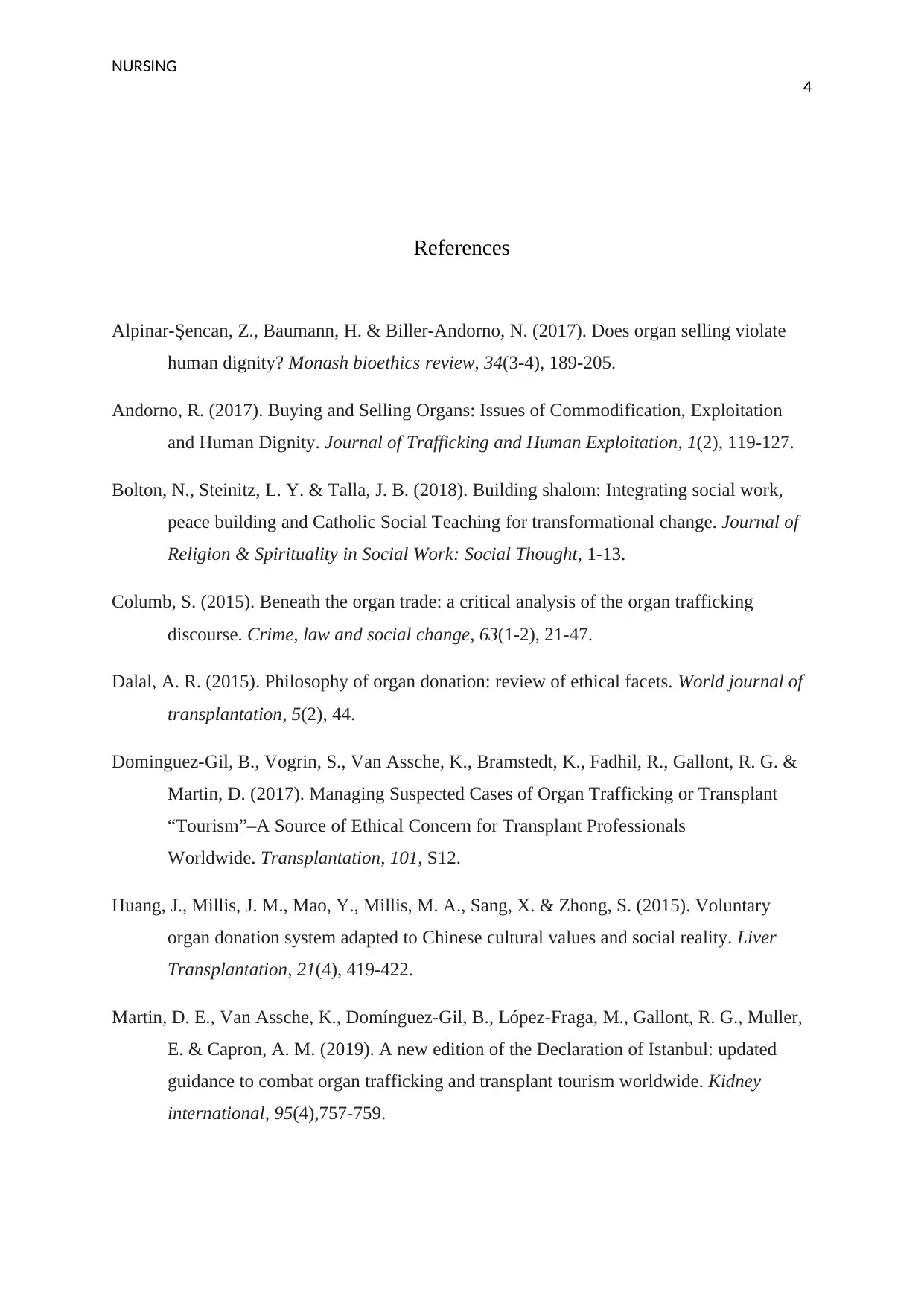
NURSING
4
References
Alpinar-Şencan, Z., Baumann, H. & Biller-Andorno, N. (2017). Does organ selling violate
human dignity? Monash bioethics review, 34(3-4), 189-205.
Andorno, R. (2017). Buying and Selling Organs: Issues of Commodification, Exploitation
and Human Dignity. Journal of Trafficking and Human Exploitation, 1(2), 119-127.
Bolton, N., Steinitz, L. Y. & Talla, J. B. (2018). Building shalom: Integrating social work,
peace building and Catholic Social Teaching for transformational change. Journal of
Religion & Spirituality in Social Work: Social Thought, 1-13.
Columb, S. (2015). Beneath the organ trade: a critical analysis of the organ trafficking
discourse. Crime, law and social change, 63(1-2), 21-47.
Dalal, A. R. (2015). Philosophy of organ donation: review of ethical facets. World journal of
transplantation, 5(2), 44.
Dominguez-Gil, B., Vogrin, S., Van Assche, K., Bramstedt, K., Fadhil, R., Gallont, R. G. &
Martin, D. (2017). Managing Suspected Cases of Organ Trafficking or Transplant
“Tourism”–A Source of Ethical Concern for Transplant Professionals
Worldwide. Transplantation, 101, S12.
Huang, J., Millis, J. M., Mao, Y., Millis, M. A., Sang, X. & Zhong, S. (2015). Voluntary
organ donation system adapted to Chinese cultural values and social reality. Liver
Transplantation, 21(4), 419-422.
Martin, D. E., Van Assche, K., Domínguez-Gil, B., López-Fraga, M., Gallont, R. G., Muller,
E. & Capron, A. M. (2019). A new edition of the Declaration of Istanbul: updated
guidance to combat organ trafficking and transplant tourism worldwide. Kidney
international, 95(4),757-759.
4
References
Alpinar-Şencan, Z., Baumann, H. & Biller-Andorno, N. (2017). Does organ selling violate
human dignity? Monash bioethics review, 34(3-4), 189-205.
Andorno, R. (2017). Buying and Selling Organs: Issues of Commodification, Exploitation
and Human Dignity. Journal of Trafficking and Human Exploitation, 1(2), 119-127.
Bolton, N., Steinitz, L. Y. & Talla, J. B. (2018). Building shalom: Integrating social work,
peace building and Catholic Social Teaching for transformational change. Journal of
Religion & Spirituality in Social Work: Social Thought, 1-13.
Columb, S. (2015). Beneath the organ trade: a critical analysis of the organ trafficking
discourse. Crime, law and social change, 63(1-2), 21-47.
Dalal, A. R. (2015). Philosophy of organ donation: review of ethical facets. World journal of
transplantation, 5(2), 44.
Dominguez-Gil, B., Vogrin, S., Van Assche, K., Bramstedt, K., Fadhil, R., Gallont, R. G. &
Martin, D. (2017). Managing Suspected Cases of Organ Trafficking or Transplant
“Tourism”–A Source of Ethical Concern for Transplant Professionals
Worldwide. Transplantation, 101, S12.
Huang, J., Millis, J. M., Mao, Y., Millis, M. A., Sang, X. & Zhong, S. (2015). Voluntary
organ donation system adapted to Chinese cultural values and social reality. Liver
Transplantation, 21(4), 419-422.
Martin, D. E., Van Assche, K., Domínguez-Gil, B., López-Fraga, M., Gallont, R. G., Muller,
E. & Capron, A. M. (2019). A new edition of the Declaration of Istanbul: updated
guidance to combat organ trafficking and transplant tourism worldwide. Kidney
international, 95(4),757-759.
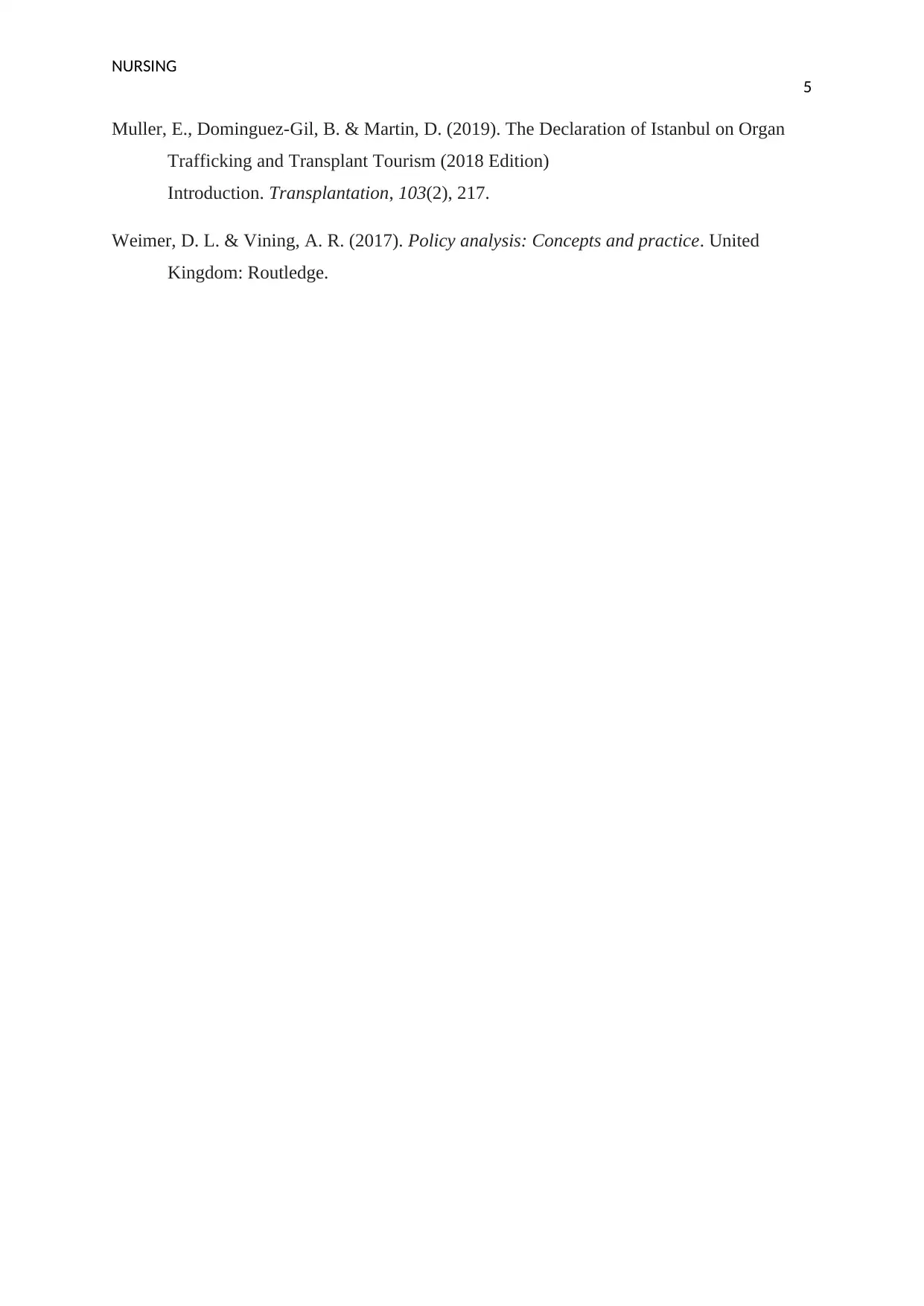
NURSING
5
Muller, E., Dominguez-Gil, B. & Martin, D. (2019). The Declaration of Istanbul on Organ
Trafficking and Transplant Tourism (2018 Edition)
Introduction. Transplantation, 103(2), 217.
Weimer, D. L. & Vining, A. R. (2017). Policy analysis: Concepts and practice. United
Kingdom: Routledge.
5
Muller, E., Dominguez-Gil, B. & Martin, D. (2019). The Declaration of Istanbul on Organ
Trafficking and Transplant Tourism (2018 Edition)
Introduction. Transplantation, 103(2), 217.
Weimer, D. L. & Vining, A. R. (2017). Policy analysis: Concepts and practice. United
Kingdom: Routledge.
1 out of 6
Related Documents
Your All-in-One AI-Powered Toolkit for Academic Success.
+13062052269
info@desklib.com
Available 24*7 on WhatsApp / Email
![[object Object]](/_next/static/media/star-bottom.7253800d.svg)
Unlock your academic potential
© 2024 | Zucol Services PVT LTD | All rights reserved.





